24 Writing
Writing is often part of the process of reporting an incident. When something goes wrong, writing about what happened can be part of the critical thinking that helps us analyze, reflect, and improve behaviour.
Written reports must be clear about what is fact and what is opinion.
Scaffolding Genre-exploring Activity
In Chapter 2, Gilles announced a ban on alcohol at the folk music festival. That decision was a consequence of a car crash the year before that involved a couple of festival volunteers (refer to page 90). Here is a part of a report to the festival committee from one of those volunteers, Kai Wheeler.
I’ve been asked to give a statement about the accident that happened last August 17. Jesse Laboucane and I were volunteers on the crew setting up the main stage at the Maskwa fairgrounds for the big show the next day. We finished about 10:00 p.m. We decided to walk back into town. It’s about 2 kilometres from the grounds. It was getting dark. We walked along the shoulder of the road. As we were crossing over Beaver Creek, we heard a car coming up behind us. As I recall, we didn’t see our shadows on the road from headlights behind us. The car didn’t have its lights on. Suddenly, I was flying through the air. I’ve been told I landed in the ditch. I had a concussion and don’t remember. I’ve learned that empty beer bottles were found in the driver’s car.
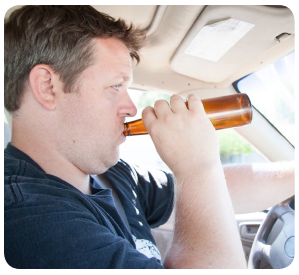
I’ve been reflecting on what happened and how it could have been prevented. First off, there are a couple of things Jesse and I could have done differently. I shouldn’t have been walking in the dark wearing black. Black-on-black isn’t cool; it’s invisible. We should have walked on the other shoulder, facing traffic. We should have looked back when we heard the car approaching. But road safety wasn’t just up to me. The driver should have turned the headlights on. The sun had set. Furthermore, there are no excuses for drinking and driving. Moreover, his buddies, who were sober, should never have gotten in the car with him. They should have taken his keys away.
![]() Let’s take a look at the way Kai organized his ideas.
Let’s take a look at the way Kai organized his ideas.
Paragraphs
There are two main ideas: a description of a past event and recommendations about accident prevention. Kai divided his report into two distinct paragraphs. He didn’t mix the facts or actions that took place with his ideas or opinions about avoiding future accidents and injuries.
Topic Sentences
Each paragraph begins with a sentence that clearly tells the reader what to expect. A topic sentence is like a road sign. It announces what’s coming. That first sentence makes the writer’s purpose very clear. All the details after that sentence relate to that topic. 
Topic Sentence Practice 
- Read the short paragraph next to each picture.
- Cross out one sentence that isn’t on exactly the same topic as the other sentences.
- Write a topic sentence for each paragraph.
- Identify whether each paragraph includes facts, opinions, or both.
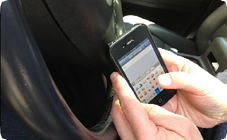 |
Paragraph 1
The first recommendation is that Musa should not text while he is driving. Second, he should look ahead at the road. Third, he should place both hands on the steering wheel. Fourth, he should not wear his watch on his right wrist. Finally, he should keep his eyes on the road. |
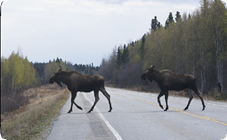 |
Paragraph 2
One of the dangers on country roads is wildlife. Drivers should look out for moose. Crashing into one of these large animals can damage a car or injure a person. Another danger is unmarked lanes. Lane lines are yellow or white. Drivers shouldn’t drive in the middle of the road. They should stay to the right. Drivers may run into danger when they aren’t familiar with the signs. They shouldn’t speed. It’s a good idea to slow down at all corners. |
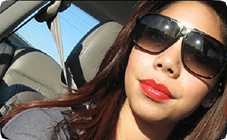 |
Paragraph 3
Sue should have put on her makeup at home. She definitely should not have put on makeup in the car. She should have used a bathroom mirror; she shouldn’t have used the rear-view mirror. The mirror shouldn’t be so small. If Sue had focused on driving, she wouldn’t have hit the power pole. She said, “I should have known better.” |
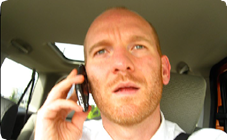 |
Paragraph 4
I was going to pick up my kids from school. The light ahead of me was green. My phone rang. You should hear the cool ring tone. My buddy was calling. As I answered it, I saw my daughter running toward me. I was listening to my friend. I should not have been listening to him. I was looking to the left. I should have been looking straight ahead. I rear-ended the car in front of me. There are no excuses for what I did. |
Scaffolding Mechanics, Grammar, and Syntax Activity
Modal Verbs of Advice 
Modal verbs add information about mood. A writer or speaker communicates his or
her mood, feelings, or attitudes through modal verbs. In Chapters 2 and 3, modal verbs such as MAY or MUST show different levels of intensity in requests, permissions, prohibitions, or obligations. Modal verbs are also useful for giving advice.
The modal verb SHOULD communicates a speaker’s strong advice. SHOULD is quite inflexible. COULD is weaker. COULD communicates possibility in addition to advice, so there is more flexibility about following the advice. MIGHT, like COULD, gives a listener the choice to follow the advice or not.
- Read the advice in the box on the right.
- Identify six modal verbs.
- Discuss which advice is flexible and which is not.
Advising with SHOULD: Present and Future 
The most helpful advice is possible to follow. In paragraphs 1 and 2 on the previous page, the recommendations are doable by Musa or any other driver. The same goes for the example paragraph on the left.
- Record all the firm advice that drivers can actually follow from those three paragraphs. A few examples have been done for you.
- Notice the form of each positive and negative verb that follows SHOULD. There are no suffixes such as -ed or -ing. There is no preposition such as TO between the modal and main verbs.
| Paragraph 1 | Paragraph 2 | Example Paragraph | |||
|---|---|---|---|---|---|
| Positive | Negative | Positive | Negative | Positive | Negative |
| should look | should not text | should look out | shouldn’t drive |
|
|
Regretting with SHOULD: Past 
When something goes wrong, we may wish we could change the past. Although this is impossible, we talk to ourselves or to others about those wishes. We express regret about unchangeable but unhappy past events using SHOULD + HAVE + VERB PAST PARTICIPLE.
Regret is a kind of sadness. A synonym for regret is “remorse.” Apologies often include an expression of regret or remorse. We apologize when we recognize that our action or inaction caused a problem or pain for someone. “Sorry” acknowledges the sorrow of past events.
Many characters in our story did things that someone regretted later. If the characters could undo the past, how could their problems have been avoided?
- For each of the actions below, express a positive and a negative alternative showing regret.
The first one is an example.
1. Claire answered Gilles’ phone.
+ She should have let the phone ring.
– She should not have answered it.
2. Gilles avoided Claire.
+ _______________________________________
– _______________________________________
3. Ivan threw garbage on Claire’s property.
+ _______________________________________
– _______________________________________
4. Dev was distant from his son, Roshan.
+ _______________________________________
– _______________________________________
5. Roshan didn’t lock his tools in Kerry’s truck.
+ _______________________________________
– _______________________________________
6. Kerry didn’t take his wife out for their anniversary.
+ _______________________________________
– _______________________________________
Writing 1 
Campers at Bear Bottom Campground are responsible for keeping their campsites clean and safe. The manager charges an additional fee when she has to remove things that campers leave behind or do not store safely.
Imagine that you spent a beautiful summer long weekend camping at Bear Bottom Campground. You planned to pack up and leave on Monday afternoon, but on Sunday evening, you got a text telling you bad news from home. It was an emergency, and you decided to drive to your home immediately to deal with it.
When Claire inspected your campsite, this is what she saw. She took photos of the evidence.
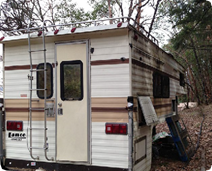
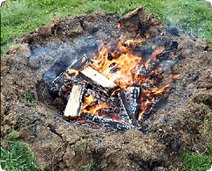
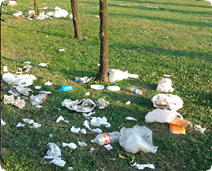
Claire sent you a bill for $225.00. That amount included the tow truck charge for pulling your trailer away, as well as a fine for leaving a fire burning unattended. In addition, she picked up leftover food, dishes, and garbage.
Write a two-paragraph letter to Claire Turner. Keep in mind that you barely know her.
- Acknowledge the facts or evidence.
- Explain why you left the campsite.
- Express feelings, or an opinion, of regret.
- Tell her what you should not have done.
- Tell her what you should have done differently
- State what you are going to do about the bill.
Production Task Rubric 
You can use the rubric below to measure your success on each part of the writing task.
| Writing Task 1
You wrote a letter about a problem you caused. One paragraph explained the facts and the second expressed regret. |
Completely | Mostly | Somewhat | Comments |
|---|---|---|---|---|
| You greeted Claire appropriately. | ||||
| You referred to the problems in the campsite and gave a reason for them. | ||||
| You expressed regret. | ||||
| You used the modal verbs SHOULD HAVE and SHOULD NOT HAVE. | ||||
| You told Claire what you will do about the bill. |
Writing 2 
Have you heard the story about four people named Everybody, Somebody, Anybody, and Nobody?
Think of an experience like the story above that you have regrets about because things didn’t go well. Although you can’t go back in time and change the facts, you wish you could.
Reflect, or think back on, that regrettable experience. Write two paragraphs that include the following:
- Describe the facts or evidence.
- Identify the resulting problem or pain.
- Explain why you did what you did.
- Express feelings, or an opinion, of regret.
- Explain what you should not have done.
- Explain what you should have done differently
Production Task Rubric 
You can use the rubric below to measure your success on each part of the writing task.
| Writing Task 2
You composed two paragraphs: the first explained a problem you caused and the second expressed regret. |
Completely | Mostly | Somewhat | Comments |
|---|---|---|---|---|
| You described the facts. | ||||
| You identified a problem or pain. | ||||
| You gave a reason for your actions. | ||||
| You expressed regret for your actions. | ||||
| You used the modal verbs SHOULD HAVE and SHOULD NOT HAVE. |

